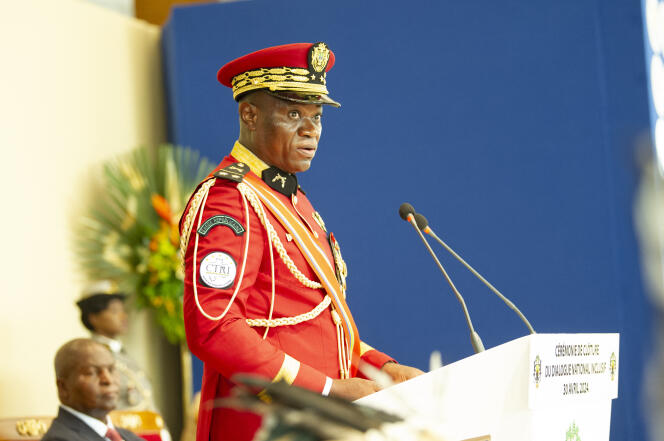Nine months after overthrowing Ali Bongo Ondimba, General Brice Oligui Nguema, president of the Gabonese transition, was received on the evening of Friday May 31 at the Elysée by Emmanuel Macron. The culmination of a five-day tour, this meeting with the French head of state constitutes a further step towards the normalization of the power of the 49-year-old putschist soldier, treated as a reliable and friendly partner by France. A relationship very different from the execrable ones that prevail with the heads of the juntas of Mali, Burkina Faso and Niger.
During this French stage, the soldier took care to justify his coup d’état, “a national liberation for the Gabonese people”, he said on Wednesday in Paris. The putsch took place a few hours after the announcement of the contested re-election of Ali Bongo Ondimba and ended fifty-five years of dynastic power for the Bongo, father and son. “The rupture that has occurred in our country must be understood as the radical desire of the Gabonese to access healthy governance,” he continued. “Even if, in form, we are putschists, in essence we are not,” explains a Gabonese minister to Le Monde.
French diplomats emphasize the “positive” signals sent by the new Gabonese authorities. In particular, they promised to end the transition by August 2025 by organizing a presidential election, in which Brice Oligui Nguema should have the right to run. While Paris is witnessing, helpless, a decline in French influence in the Sahel, it welcomes the good relations maintained with Libreville since the coup d’état – these had on the contrary deteriorated under Ali Bongo Ondimba, whose father was one of the pillars of “Françafrique”.
Aligned views
No vindictive speech has yet been made by the Gabonese junta, which refuses to see the presence of the French base on its soil as a symbol of neocolonialism. “Can we imagine that the NATO military base in Germany calls into question the sovereignty of this country? Why would a French military base here do it? », Estimates Charles M’Ba, the Gabonese Minister of Public Accounts. At the initiative of Paris, as in other African countries which host French bases, discussions are nevertheless underway on the future of this influence.
On several issues, the two countries display aligned views. After the holding of the One Forest Summit in March 2023 in Libreville dedicated to the preservation of the tropical forest, where Emmanuel Macron made the trip, Paris intends to continue its collaboration with Ali Bongo’s successor on ecological issues. The two leaders signed “a declaration of intent to develop this partnership through the formation of a coalition of public and private partners wishing to provide financial support to Gabon for the implementation of its commitments in terms of protecting its carbon and biodiversity resources, and to invest in the bioeconomy in Gabon,” the French presidency announced in a press release.
Economic relations were indeed at the heart of the visit. Accompanied by a dozen ministers and a strong delegation of businessmen, General Oligui Nguema became his country’s VRP. “We are before you to invite you to Gabon, land of all opportunities,” he told the six hundred French and Gabonese entrepreneurs who came to listen to him on Wednesday in Paris, during the first Gabon-France economic forum supervised by Medef and the Gabonese Ministry of the Economy.
Between patriotism and openness
The message undoubtedly reassured French bosses who were worried after the new regime’s decision to promote, in the name of economic patriotism, the interests of Gabon. The State recently bought Assala, one of the oil flagships, from the American investment fund Carlyle, dashing the hopes of the French Maurel et Prom which was in the running.
However, Libreville assures us, French companies, which operate on 25% of the Gabonese market, remain key partners in revitalizing the country. The Gabonese Minister of the Economy, Mays Mouissi, and the French Minister Delegate for Foreign Trade, Franck Riester, signed protocols of principle of participation relating to the repair of the Transgabonais railway and the rehabilitation of the saturated landfill of Mindoubé.
“French companies are ready to establish a new Gabon-France economic partnership and to support the action of your government,” rejoiced Philippe Labonne, president of the Africa committee of Medef International. The new authorities have clarified their intentions, between patriotism and openness to international partners. “We want to have control of most of our resources. Everything that concerns Gabon must be decided by the Gabonese,” explains Charles M’Ba.
“But sovereignty does not preclude friendship. We want to develop our economy with national operators without rejecting foreigners to whom we appeal to invest massively, while respecting our rules,” argues the technocrat who was exiled for seven years in France. The minister also met several French personalities, including Dominique Strauss-Kahn who offered his services to facilitate relations between Gabon and donors.
Before leaving France, Brice Oligui Nguema will participate on Sunday in the commemorations of the 80th anniversary of the Landing. In Airaines (Somme), on Sunday, he will pay tribute to Captain Charles Mésany N’Tchoréré, a Gabonese soldier who died a hero, shot by the Nazis during the Second World War, and patron saint of the Gabonese army.

